They say you can choose your friends, but sure can’t choose your family. mid-day meets unconventional familial units made up of motley handpicked members, who are fighting insecurities and hostile law so that they don’t die lonely
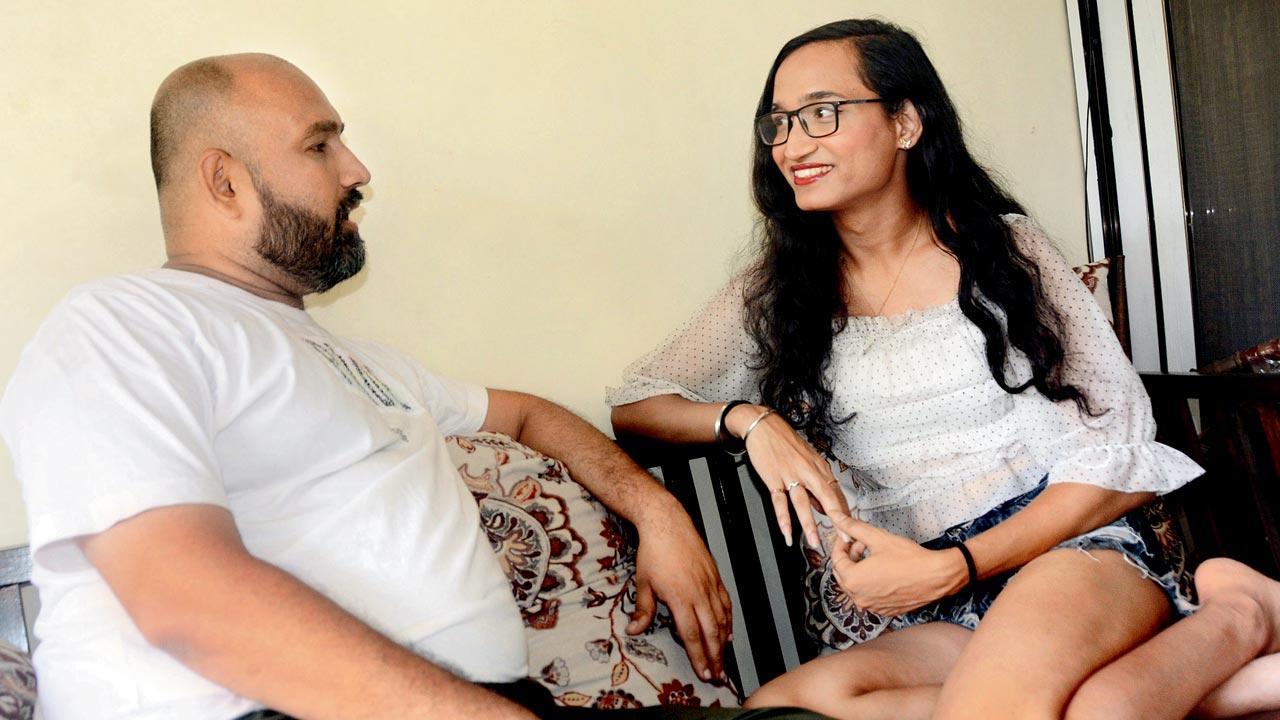
Vashi resident Charles Arthur Williams, 38, a CSR professional, says his “daughter” Anjali Siroya, a capacity building officer who identifies as trans, is part of his chosen family. Pic/Sayyed Sameer Abedi
Family is numero uno. A group of persons that you can call home. The idea got a little lift this week, when the Supreme Court remarked that non-traditional, queer relationships also constitute a family.
ADVERTISEMENT
While hearing a case involving a woman’s right to avail maternity benefits for a child that is not biologically hers, the apex court also made some observations about the definition of family. A bench comprising Justices DY Chandrachud and AS Bopanna observed that “family may take the form of domestic, unmarried partnerships or queer relationships. These manifestations of love and of families may not be typical but they are as real as their traditional counterparts.” The court observed that such family units should be entitled to equal protection under the law, as well as the benefits available under social welfare legislation.
The observation comes in the light of a long-standing legal battle to get same-sex marriages and civil unions legally recognised, a move opposed by the Centre, despite decriminalisation of Section 377 of the Indian Penal Code.
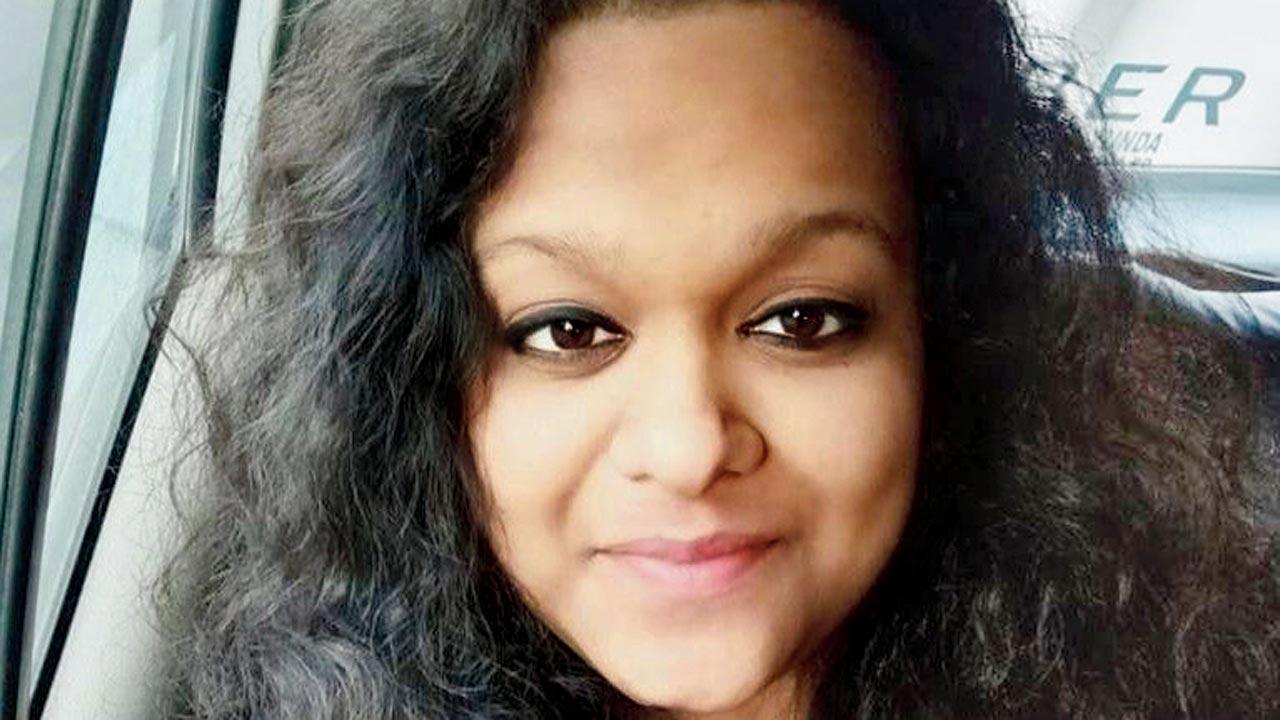 Vandita Morarka, lawyer and Founder-CEO of One Future Collective
Vandita Morarka, lawyer and Founder-CEO of One Future Collective
That the remarks were just an obiter dicta—a judge’s expression of opinion uttered in court—means it does not set a legal precedent or is not legally binding. “This is important because India follows a common law system. So, we have our statute law and over time, different case laws become part of the law, especially when given by specific benches. Here, what has essentially happened is that the decision of the case is on how the Maternity Benefits (Amendment) Act must be interpreted in light of the changing family dynamics, rather than becoming binding on the larger question of queer relationships or alternative family setups,” says Vandita Morarka, lawyer and Founder-CEO of One Future Collective, a feminist youth-led non-profit. “The judgment reflects the personal sensibilities of a few judges and not systemic change. If these sensibilities had resulted in a binding judgment, I would have welcomed it.”
Irrespective, she says that “reading this was hopeful and validating for my queer self”. “But I’ve also witnessed first-hand the tendency of judges to make such observations often only to not apply them when it comes to deciding cases. There’s a difference in saying the right thing and doing the right thing. I think the courts need to start doing more of the latter,” she says.
Harish Iyer, equal rights activist, and impleader in the Section 377 case, however, feels that the “affirmation from Justice Chandrachud” was much needed. “It affirms my belief in the judiciary.”
“In keeping with the changing face of society, we need to constantly move from a monochromatic view to one where we look at relationships from a kalideoscopic lens. I am glad that we are making progress. The battle for absolute equal rights is going to be a long one, but statements like these, hold a mirror to society and accelerate our race towards our goal,” says Iyer.
Four units of people who aren’t related by blood or law, tell us what it means to live like a family when the law doesn’t recognise you.
‘We couldn’t even rent a car together’
Vishaal Asrani & Jiji Subi, educators and creative entrepreneurs, Mumbai
Identify as gay; together for 18 years
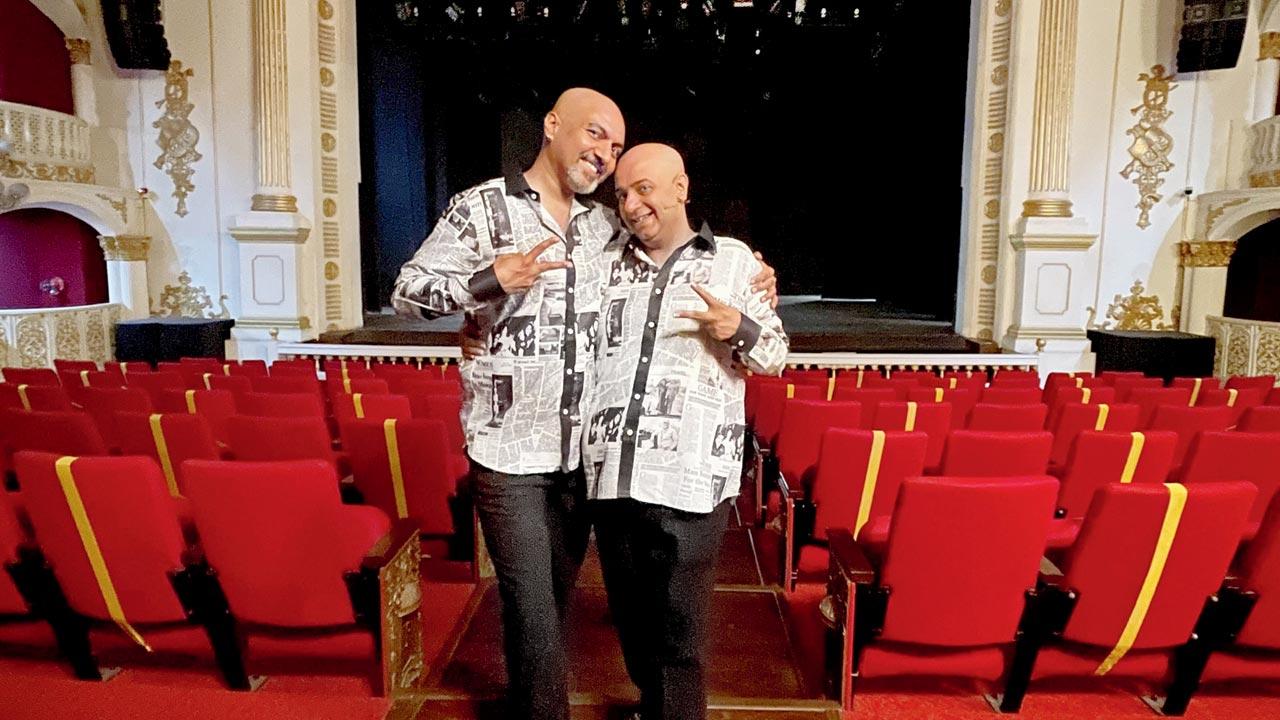 Vishaal Asrani and Jiji Subu
Vishaal Asrani and Jiji Subu
Love is love,” Vishaal Asrani says. He is co-director of Vishaal Asrani’s Institute of Performing Arts which he runs with partner Jiji Subi. They get on a video call with mid-day hours before they are to take a flight to Bangkok for a holiday with Vishaal’s parents. The couple has been together for nearly 18 years, and live with their pets—son ‘Sammy’ and daughter ‘Zoey’.
Vishaal says he always knew he wanted to be married. “Even as a child,” he insists. “But growing up... I was confused. I couldn’t see myself with a wife and children. Something didn’t seem right. But every time I saw a good looking man, I felt nice about it.”
 Live with their pets Sammy and Zoey
Live with their pets Sammy and Zoey
Jiji came into his life when he least expected it. Then working in the Indian Air Force, Jiji “a dashing 23-year-old” posted in Hyderabad, met Vishaal on a dating site. The duo met soon after in Mumbai, moving in together six years later. While Vishaal’s parents were initially not comfortable, they later helped them look for a home in the city. “They did this because they loved me,” thinks Vishaal. “In fact, for the first six months, they didn’t even come over, despite living just 10 minutes away.” Jiji’s parents haven’t yet reconciled with their relationship, and don’t talk to their son, their only child.
Since the couple took their vows in San Francisco in 2008, they’ve faced a lot of ups and downs. “We’ve been ostracised, but at no point did we lose hope in each other. And it’s getting better,” feels Vishaal. His parents, especially his mother, are now closer to Jiji than him, he jokes.
“We live like any other family,” says Jiji. “We have a joint bank account, and though we run an institute together, it’s never your share of money or mine... I don’t remember discussing it [at any point]. Some might call it unhealthy, but that’s how we function.” Apart from their pets, the children from their institute form an integral part of their ecosystem. “We didn’t want children of our own. Since we are educators, our students fill that vacuum, and we have over 3,000 of them!”
While the couple sees the Supreme Court’s observation as a “hopeful one”, they say that they still cannot jointly rent a home. “We are working towards making a will, where we make each other nominees to everything that we have. Perhaps that’s all the courts will recognise. But it worries us, because tomorrow if one of us is in the hospital, legally, our parents could walk in and make crucial decisions. Unfortunately, as his partner, I still have no rights over him,” says Vishaal. He recalls how recently when processing a car rental agreement, the company refused to send the vehicle to the couple’s Worli home, because the house was on Jiji’s name, and the rental agreement was in Vishaal’s. “They wouldn’t acknowledge us as family, because we didn’t have a traditional marriage certificate. We eventually had to pick up the car from my parents’ home, since that house is in my name,” says Vishaal. Jiji adds, “One could just lose the tenacity to fight...”
‘It can get very lonely; nobody wants to die alone’
Charles Arthur Williams, identifies as gay, Mumbai
Lives informally with ‘adopted’ daughter Anjali Siroya, a trans woman
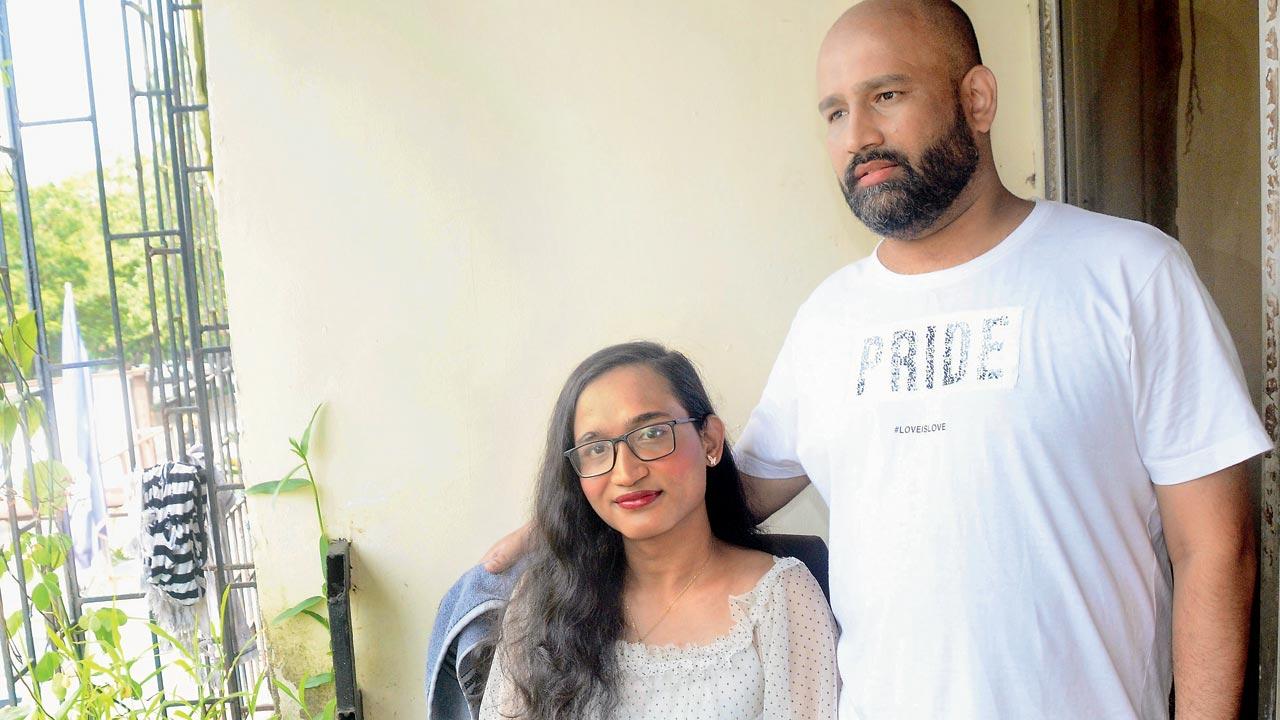 Charles Arthur Williams met Anjali Siroya on a dating app nearly a decade ago. Pic/Sayyed Sameer Abedi
Charles Arthur Williams met Anjali Siroya on a dating app nearly a decade ago. Pic/Sayyed Sameer Abedi
On Charles Arthur Williams WhatsApp contact list, Anjali Siroya’s number has been saved as “Papa ki Pari”. Williams, who is a CSR head, and Siroya, a capacity building officer and transgender rights activist with The Humsafar Trust, incidentally met on a dating app. “But within moments of chatting with her... I knew I had developed parental feelings for her,” he says.
Anjali came out to her family nearly seven years ago, and continues to live with them. But the weekends are reserved for “daddy”. It’s the fear of non-acceptance that made her reach out to Charles. “Daddy has a very nuanced understanding of community, and he was able to share that with me. He has always been like an elderly figure, taking care of me, and guiding me.” She says it took time for her to call him “daddy,” “but now I can’t even remember when I last called him by name”.
Charles was battling his own demons when he ‘adopted’ Anjali. “It can get very lonely,” he tells mid-day. “I’ve seen people of my generation suffer, because they didn’t have a strong support system.” “Both Anjali and I can have the deepest and darkest conversation, without judging the other. That gives us comfort. When you are a family, everyone is expected to be transparent with each other. That’s also how our relationship is.”
The duo’s chosen family is not restricted to the two; in fact, Charles has several other ‘adopted’ children. He says they all meet over the weekend at his Vashi residence, cook together, go shopping for groceries, or just hang out. “This weekend, we will go Ganesh pandal-hopping,” he says, adding, “We also argue a lot, because both of us are very passionate about our work. She has brilliant exposure to diversity and inclusion, so there is a lot to learn from her. I, on the other hand, engage in philosophical research. It’s an interesting rapport to share.” Charles’ biological mother and sister also share a rapport with Anjali. “My mother loves her. But our primary focus is that along with our biological families, we also nurture our chosen family.”
Anjali says that having a “chosen family” can lead to insecurity among members of the biological family, because there is the fear of the child moving away or being influenced. “But we look to our chosen family for social support. Sometimes, a biological family doesn’t offer a queer person space to express their identity.” The truth, says Charles is “that there is nobody for us”. “Heterosexuals get married and have children... in a way, this cycle protects them when they grow old. Humara waisa nahin hota. There are gay men who die alone; that’s not something I would not want for anyone.”
‘I couldn’t leave my ex, so I moved in with them’
Trupti & Rupa,professional therapists, Mumbai
Live with their chosen family, comprising Trupti’s ex-partner Teju and their girlfriend Arohi, a dog and five cats
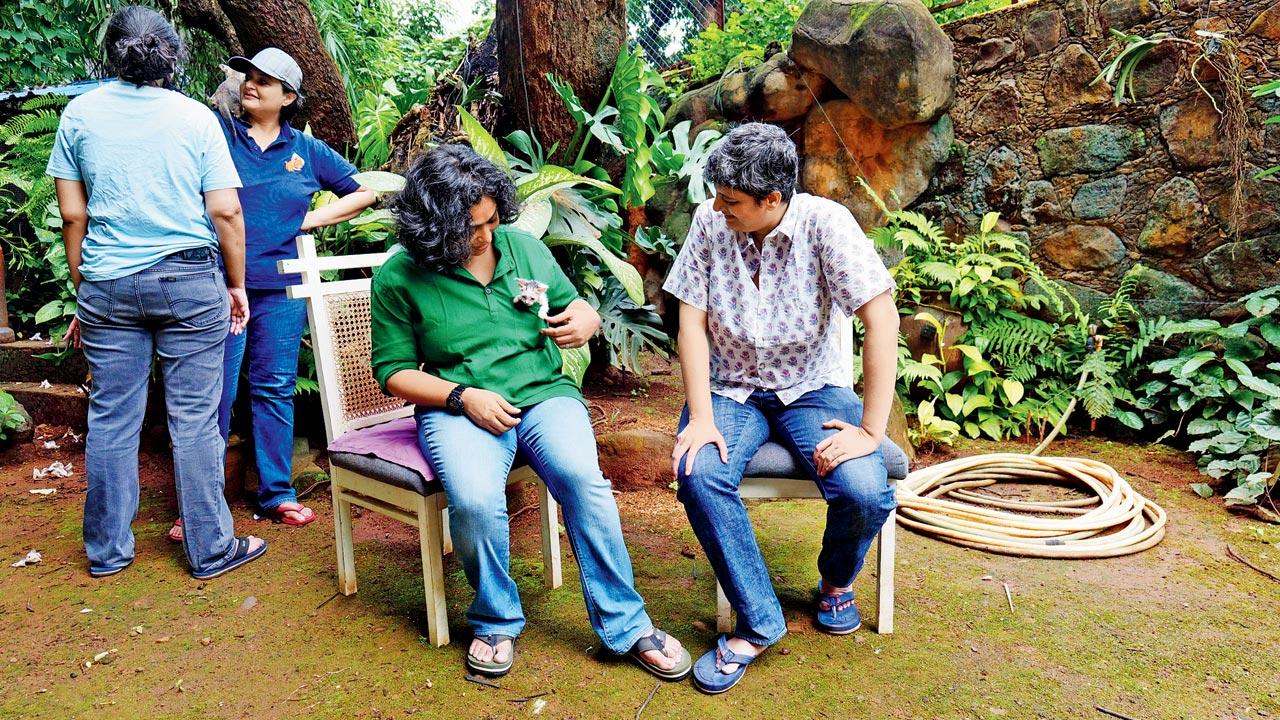
Relationhips, like love, can be complicated. But sometimes, instead of trying to make sense of it, it’s best to sink your teeth right in, feels Trupti. The city-based psychologist welcomes us into the Bandra home she shares with her girlfriend Rupa, and their
chosen family.
Trupti and her ex-partner Teju are the nucleus of this family, because in a way, it grew with them. The two met when they were in their early 20s, at a time when both were trying to make sense of their sexuality and gender presentation. “We realised after a few years that we were fond of each other, but weren’t compatible as romantic partners. Yet, it was too heartbreaking to separate. For almost 10 years, I had seen myself as a joint unit with my partner, not just our lives but our identities interlinked as a couple. We both recognised that leaving the other would deprive us both,” she says.
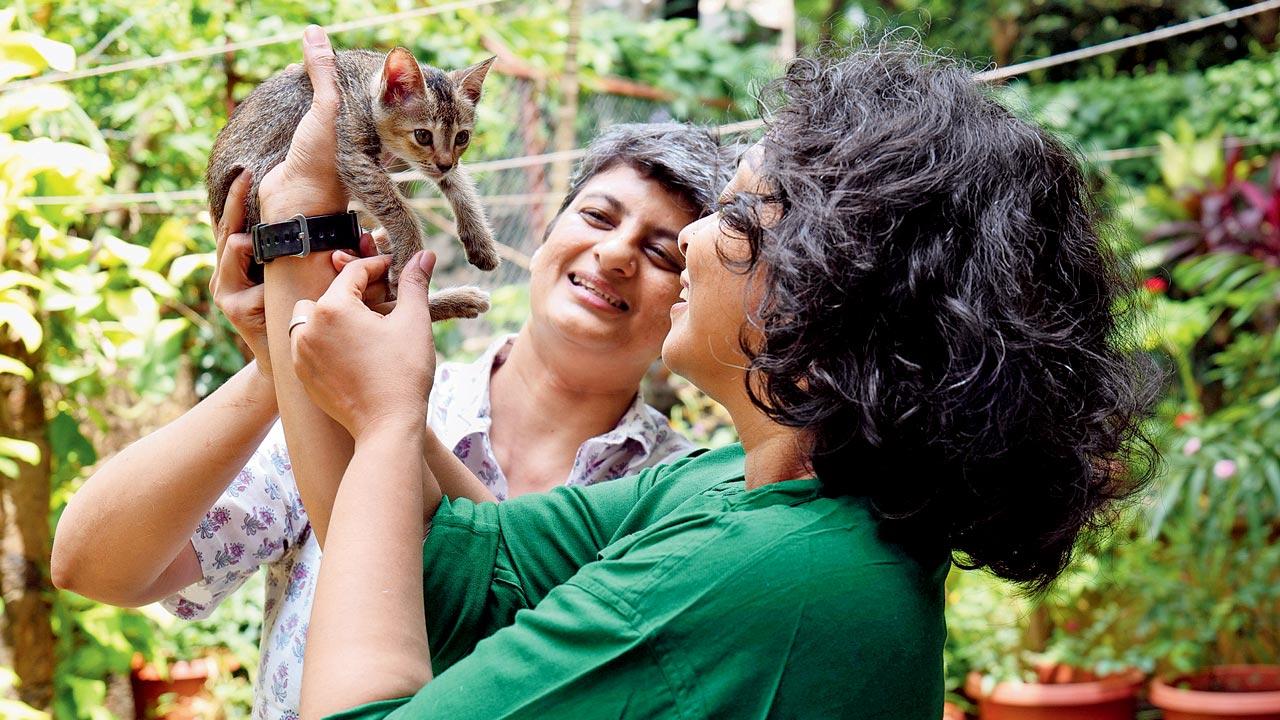 Rupa (green shirt), Trupti’s girlfriend, says she understood why she was unable to break familial ties with her former partner Teju. “We had to learn to normalise the jealousy that would come and go,” she says. Pics/Shadab Khan
Rupa (green shirt), Trupti’s girlfriend, says she understood why she was unable to break familial ties with her former partner Teju. “We had to learn to normalise the jealousy that would come and go,” she says. Pics/Shadab Khan
By then, the two had also started fostering animals together. “We wanted to continue to be co-parents to our pets. I moved in with them [Teju].” This was in 2015, she adds. Meanwhile, they were now free to date other partners.
Teju, who works in the social sector, had begun seeing their girlfriend Arohi, leaving Trupti with feelings she had to come to terms with. “I did question my place in Teju’s life. I even resorted to therapy, and it took me a year to settle down. My insecurities didn’t come from a romantic place, but from not knowing my purpose in Teju’s life,” says Trupti. Teju adds, “She was too important for me to let go. We had a history together.”
Around 2017, Trupti found new love in Rupa, a fellow therapist. When Rupa was told about the chosen family, she understood where her girlfriend was coming from. “My own ex has been a huge support system for me. I was not fully out [of the closet], and that person, for the longest time, was the only witness to my queerness. This helped me understand Trupti’s decision.”
But, it took work, they admit. “We had to learn to normalise the jealousy that would come and go... firstly, to not feel bad about feeling it, and then, to take care of ourselves. Trupti would attend to my doubts, rather than dismiss them,” adds Rupa.
Their chosen family has got consolidated only over the last couple of years. Trupti likens her chosen family to a “cocoon”. “It is a safe space. It is nurturing. It helps us grow and thrive. And it is transforming,” she thinks. Everyone in the home, she says, has realised that they are equally or differently important to each other. While Arohi and Rupa are in charge of the kitchen, Trupti and Teju look after the pets. They all contribute to running the house basis their incomes. “Those who earn more, contribute more to household expenses,” says Trupti.
Rupa admits though, that partnership rights still elude them. “As we grow older, there is also the realisation of end-of-life care, but the law only sees blood relatives or marriage partners as next of kin. At critical moments, like during the pandemic when some queer people were battling illness, their partners were kept away. Chosen families need to be recognised in the eyes of the law.”
‘My mother packs my partner’s daily dabba’
Megha Nandi, identifies as lesbian cis woman, Lucknow
Lives with her partner Haxia and mother Anindita
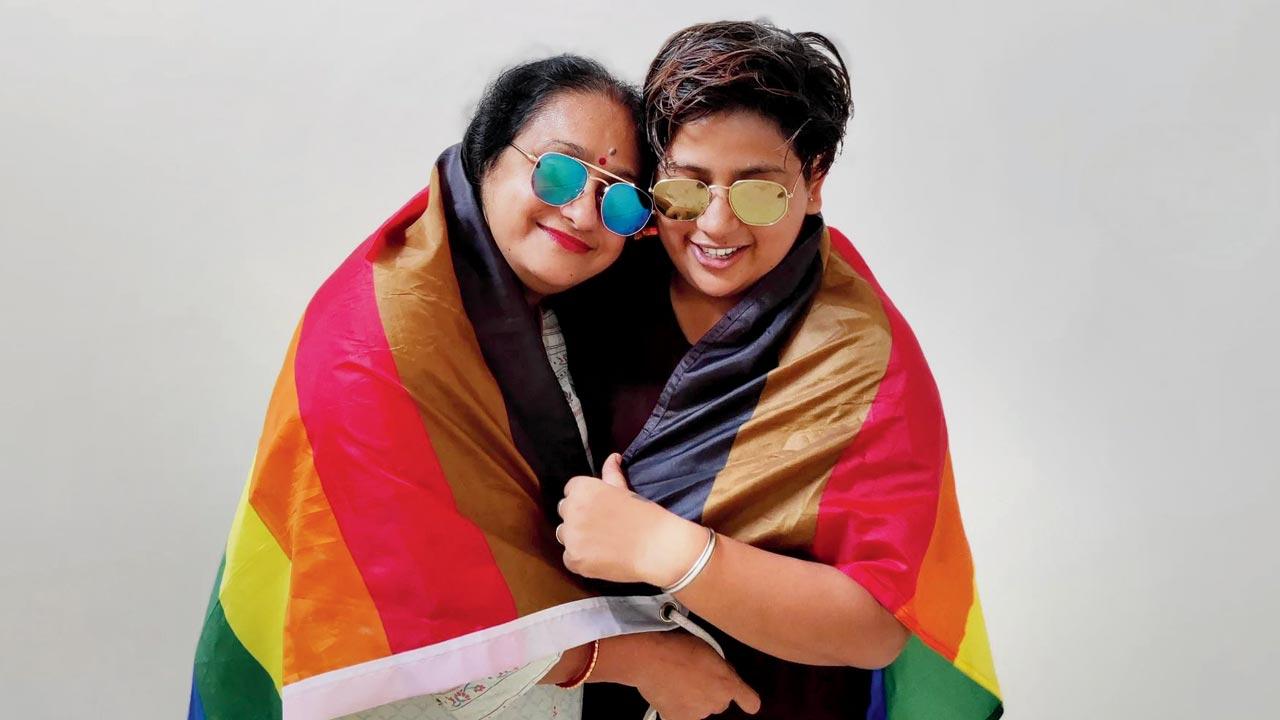 Megha Nandi and her mum Anindita’s bond strengthened after the loss of Megha’s elder sister in a road accident three years ago
Megha Nandi and her mum Anindita’s bond strengthened after the loss of Megha’s elder sister in a road accident three years ago
Graphic designer and queer rights activist Megha Nandi met her Kashmiri partner on a dating app a year ago. The couple spent some time in Kashmir, after which Haxia came to Lucknow to pursue a graduation degree. The initial impetus to move in together was the toxic environment in Haxia’s hostel. “It was a homophobic and orthodox environment. When students found out about us, they gossiped, and ragged her. It was affecting her mental health. Later, when the warden learnt of us, she barred me from visiting,” says Megha. Haxia move in with Megha and her mother Anindita.
“My mum actually liked her a lot, she found her innocent and sweet. I remember this one time, when I fell ill, Haxia came home with fruits. My mother realised then that Haxia cared for me as much as she did.”
That Megha lost her elder sister in a road accident three years ago, also brought the mother and daughter closer. “My mum separated from my father; he was abusive. We have gone through a lot together, and it’s one of the reasons why we have each other’s back. If I am happy, she is.”
Theirs, they say, is like any other family. “My partner has to leave for college early. Even before she’s up, mum is busy in the kitchen, making her breakfast and packing her lunch. The two of them also go shopping, because they share similar tastes.”
Haxia’s family, says Megha, hasn’t accepted her identity, but she is hopeful that they will come around. However, the recent SC observation, she feels, was nothing but tokenism. “Family means different things to different people. It cannot be boxed by traditional ideas. If we need change, we need to start making laws that
drive change.”
2.5m
No. of homosexuals in India, acc to a govt report submitted to SC in 2012. There is no official data available on India’s queer population and activists say stigma, lack of awareness has led to low numbers
 Subscribe today by clicking the link and stay updated with the latest news!" Click here!
Subscribe today by clicking the link and stay updated with the latest news!" Click here!







